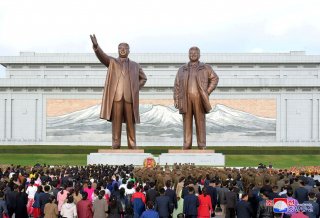Kim Jong-un Is Probably Alive (But What Is North Korea's Plan If He Isn't?)
The new leader would have to be a Kim unless the regime wants to risk its legitimacy.
Unconfirmed rumors surrounding the poor health of Kim Jong-un, and a possible botched heart operation that may have left him fatally ill, in a coma, or already deceased have prompted speculation about the consequences of the death of the North Korean leader.
Given the unreliability of similar such stories in the past, it would be wise not to lend them too much credence at this early stage, especially since U.S. and ROK officials are increasingly skeptical that they are well-founded. Satellite evidence of what seems to be Kim’s train at Wonsan on the East Coast, suggests that Kim is more likely to have simply retreated from public view, possibly because of generic worries about his health and fear of being exposed to COVID-19. Kim’s weight, his smoking habits, and his family history of diabetes all represent underlying conditions that would make him especially vulnerable to the risk of infection, and so it would be logical to assume that Kim would be especially concerned to practice his own form of social distancing. There had been speculation earlier in February, in some foreign government circles, that already Kim has been limiting some of his public appearances out of fear of infection—and the current low profile may represent more of the same.
Wonsan as a destination may also have been attractive to Kim perhaps because of its proximity to missile testing sites on the East Coast. After all, publicly bolstering the North’s military deterrent capabilities is likely to have been increasingly important to the Kim at a time when COVID-19, the continuing deadlock over talks with the United States, and the persistence of sanctions make him especially keen to appear strong and resilient at a time of potential increased national vulnerability. Wonsan may equally be attractive given the existence of the Wonsan-Kalma tourism development project and where there is construction work underway that was scheduled to be completed by April. Tourism is a core element in the government’s economic (and political) strategy and ensuring that this continues on track is personally important to the leadership.
If despite the denials from ROK and U.S. sources, Kim has in fact died, then attention immediately turns to the question of a possible successor. Of the possible replacements, Kim’s sister, Kim Yo-jong has been touted as a leading candidate, given the importance of family ties in the North’s system of de facto hereditary rule—the so-called Mount Paektu bloodline. Responsible for state propaganda and public relations and having accompanied her brother for his summits with Presidents Trump and Moon, she is clearly a trusted member of the country’s senior leadership. This is especially true since she has just been reappointed to the Politburo this April, following her temporary removal in the wake of the failure of the February 2019 Hanoi summit. Proximity to power, however, is not necessarily a sign of actual authority. Her age (31) and gender (in a society that retains a traditional chauvinistic bias in favor of male leadership) are likely to count against her.
Alternative successors include Kim Pyong-il (Kim Jong-il’s half-brother) and even Kim Jong-chul, Kim Jong-un’s one surviving older brother, since Kim Jong-nam’s 2017 assassination. Kim Jong-chul is a long shot given his alleged “effeminacy” and rumored unsuitability; Kim Pyong-il, has age (65) and experience (having served as ambassador in Eastern Europe) on his side and a reputation for being self-effacing and politically low profile. (Although that might count against him in wielding power in a regime where brutality and decisiveness are part of the leadership job description.) Some sort of collective leadership and temporary interregnum, perhaps with Choe Ryong-hae, the nominal head of state and number two in the official hierarchy, playing a key role, has also been discussed. But this would be unprecedented and would also interfere with the dynastic narrative that is so important in the North Korean “theatre state” where symbolism, nostalgia and historicized authenticity are key.
Kim’s death, in the first instance, will require the regime to bolster its military preparedness, establish a clear narrative of political continuity and avoid any social or economic disruption. The government, whoever is nominally in charge, is likely to be fearful of potential threats at home and abroad, unreceptive to immediate negotiations with foreign powers, and more focused on the ceremonial and symbolic aspects of ensuring the appearance of an orderly leadership transition.
Dr. John Nilsson-Wright is a Senior Lecturer of Japanese Politics and International Relations at the University of Cambridge and a Senior Research Fellow for Northeast Asia at Chatham House. You can follow him on Twitter at @JNilssonWright.
Image: Reuters.

